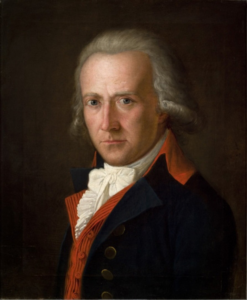Song from afar
(Poet's title: Lied aus der Ferne)
Set by Schubert:
D 107
[July 1814]
Part of The Theresa Grob Album
Wenn in des Abends letztem Scheine
Dir eine lächelnde Gestalt
Am Rasensitz im Eichenhaine
Mit Wink und Gruß vorüberwallt:
Das ist des Freundes treuer Geist,
Der Freud’ und Frieden dir verheißt.
Wenn in des Mondes Dämmerlichte
Sich deiner Liebe Traum verschönt,
Durch Zytisus und Weimutsfichte
Melodisches Gesäusel tönt,
Und Ahndung dir den Busen hebt:
Das ist mein Geist, der dich umschwebt.
Fühlst du beim seligen Verlieren
In des Vergangnen Zauberland
Ein lindes, geistiges Berühren,
Wie Zephyrs Kuss an Lipp und Hand,
Und wankt der Kerze flatternd Licht:
Das ist mein Geist, o zweifle nicht!
Hörst du beim Silberglanz der Sterne,
Leis im verschwiegnen Kämmerlein,
Gleich Äolsharfen aus der Ferne,
Das Bundeswort: Auf ewig dein,
Dann schlummre sanfts es ist mein Geist,
Der Freud’ und Frieden dir verheißt.
If, in the last glow of evening
You see a smiling face
While sitting on the grass in the oak grove
And it nods and greets you as it passes,
That is the faithful spirit of your friend
Promising you joy and peace.
If, in the soft light of the moon
Your dream is made beautiful by your love,
And through broom and Weymouth pines
Melodious sounds ring out,
And your breast swells with presentiments,
That is my spirit surrounding you.
If you feel, while happily lost
In the magical land of the past,
A gentle, spiritual touch,
Like a zephyr’s kiss on your lips and hand,
And if the flickering light of the candle sways,
That is my spirit, don’t doubt it!
If you hear, by the silver glow of the stars,
Softly in your little secluded room,
Something similar to Aeolian harps in the distance,
The word of commitment: “Yours for ever!”
Then you can sleep calmly. It is my spirit
Promising you joy and peace.
All translations into English that appear on this website, unless otherwise stated, are by Malcolm Wren. You are free to use them on condition that you acknowledge Malcolm Wren as the translator and schubertsong.uk as the source. Unless otherwise stated, the comments and essays that appear after the texts and translations are by Malcolm Wren and are © Copyright.
☙
Themes and images in this text:
Candles Chest / breast Dreams Evening and the setting sun Grass Hands Harmony Harps and Aeolian harps Joy Kissing Light Lips Magic and enchantment Melody Night and the moon Oak trees Pine trees Rooms Serenades and songs at evening Silver Stars Wind Woods – groves and clumps of trees (Hain)
Matthisson wrote Lied aus der Ferne, a poem about the senses and sensitivity, in the same year that Jane Austen published ‘Sense and Sensibility‘. The addressee is urged to be open to a number of slight sensations that indicate the presence of an absent spirit. Sight, hearing and touch are all needed, since the spirit insists that it / he / she is accessible to physical perception. The physical conditions in which the encounters might occur are unusually specific. We are used to the poetic idea of being open to spiritual liminal experiences at sunset or in the moonlight generally, but here the Linnean categories (e.g. Cytisus) of the sheltering trees and shrubs (oaks, spruce and broom) are specified.

https://ncbirdnerd.com/2020/07/02/my-love-for-weymouth-woods-sandhills-nature-preserve/
In these places, at these times, you will hear a rustle of the leaves and feel the breeze on your skin. If you are sufficiently sensitive you will hear melodious sounds and feel a kiss, both of which are physical sensations that betoken the presence of a distant spirit. This sensitivity (note that sensuality – there is no reference to taste or smell – is not involved other than in the kiss on the lips that comes from the breezes) is also represented by the image of the Aeolian harps, which capture a harmony inherently present in the air around us but to which we are normally deaf.
Do we have the ‘sense’ to perceive this? Some people go through life with ‘no inkling’ of that other dimension. They don’t have a clue; the German phrase for this is ‘keine Ahnung’ (stanza 2). An Ahnung (or Ahndung) is an intimation or a presentiment. In this context ‘pre-sentiment’ seems to be exactly what the poet is writing about, a sensation that is perceptible slightly beneath the level of consciousness, an openness to the possibility of experience rather than a reaction to it.
The nature of the relationship between the writer and the addressee is left vague. Is the spirit (Geist) departed (a ghost)? Are they lovers who can never be together? Are they elective affinities who are married to other people? Might they even be people who are physically close but spiritually distant?[1]
That was the situation for Sylvia Plath, writing about her inability to escape the spirit of her husband, Ted Hughes, in The Rabbit Catcher of 1962, which uses some of the same imagery as Matthisson, but to different ends. Here we have a yellow flowering shrub (in this case gorse rather than broom) and a flickering candle (the old image of mortality). We also have a super-sensitive soul who cannot avoid experiencing her partner everywhere. For her, a day out by the sea with Ted Hughes was an experience of excruciating torture, and her attempt to destroy some rabbit traps was both a symbol of her sensitivity to the suffering of other innocents and an indication that she herself had been caught. However, in Hughes’s response to her poem (published in Birthday Letters in 1998, as he was dying) there is the suggestion that Plath’s anger was wrongly directed.
You were weeping with a rage That cared nothing for rabbits. You were locked Into some chamber gasping for oxygen Where I could not find you, or really hear you, Let alone understand you. In those snares You'd caught something. Had you caught something in me, Nocturnal and unknown to me? Or was it Your doomed self, your tortured, crying, Suffocating self? I tasted the malignity of the gorse, Its black spikes, The extreme unction of its yellow candle-flowers. They had an efficiency, a great beauty, And were extravagant, like torture.
[1] All of these possibilities are evoked by the Matthisson texts that Schubert chose to set to music in 1814 (e.g. D 95 Adelaide, D 97 Trost, D 98 Erinnerungen, D 99 Andenken, D 100 Geisternähe). Schubert’s own reading of the situation might be inferred from the fact that he included Lied aus der Ferne in the selection of songs prepared for Therese Grob, whom he had wanted to marry.
☙
Original Spelling Lied aus der Ferne Wenn, in des Abends letztem Scheine, Dir eine lächelnde Gestalt, Am Rasensitz im Eichenhaine, Mit Wink und Gruß vorüberwallt: Das ist des Freundes treuer Geist, Der Freud' und Frieden dir verheißt. Wenn in des Mondes Dämmerlichte Sich deiner Liebe Traum verschönt, Durch Cytisus und Weymutsfichte Melodisches Gesäusel tönt, Und Ahndung dir den Busen hebt: Das ist mein Geist der dich umschwebt. Fühlst du, beim seligen Verlieren In des Vergangnen Zauberland, Ein lindes, geistiges Berühren, Wie Zephyrs Kuß, an Lipp' und Hand, Und wankt der Kerze flatternd Licht: Das ist mein Geist, o zweifle nicht! Hörst du, beim Silberglanz der Sterne, Leis' im verschwiegnen Kämmerlein, Gleich Aeolsharfen aus der Ferne, Das Bundeswort: Auf ewig dein! Dann schlummre sanft; es ist mein Geist, Der Freud' und Frieden dir verheißt.
Confirmed by Peter Rastl with Schubert’s source, Gedichte von Matthisson. Neueste verbesserte Auflage. Wien und Prag bey Franz Haas 1810. pages 171-172; with Gedichte von Friedrich Matthisson Dritte vermehrte Auflage. Zürich, 1794 bey Orell, Gessner, Füssli & Comp., pages 133-134; and with Gedichte von Friedrich von Matthisson. Erster Theil. Tübingen, bei Cotta, 1811, pages 274-275.
First published in Musen-Almanach für 1794, herausgegeben von Joh. Heinr. Voß, Hamburg, bey C.E.Bohn, pages 86-87.
To see an early edition of the text, go to page 171 [179 von 296] here: http://digital.onb.ac.at/OnbViewer/viewer.faces?doc=ABO_%2BZ169509602


